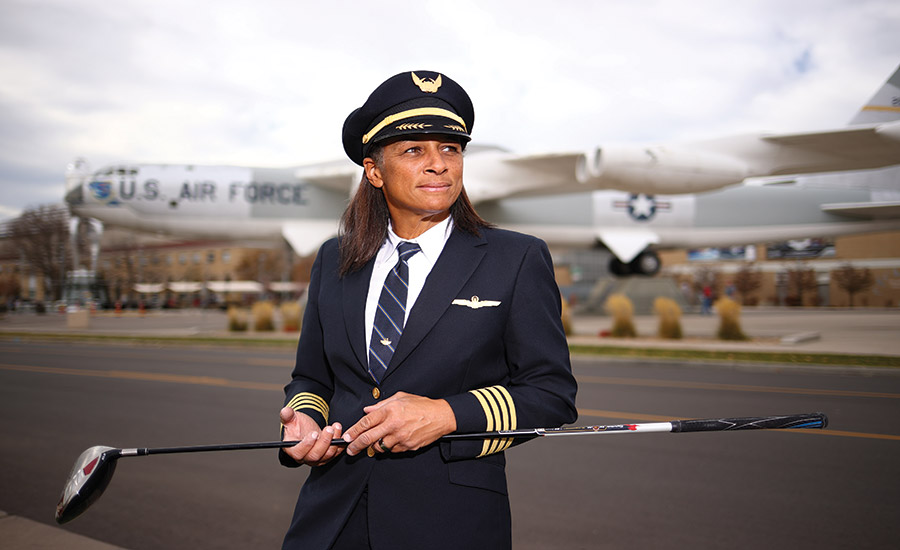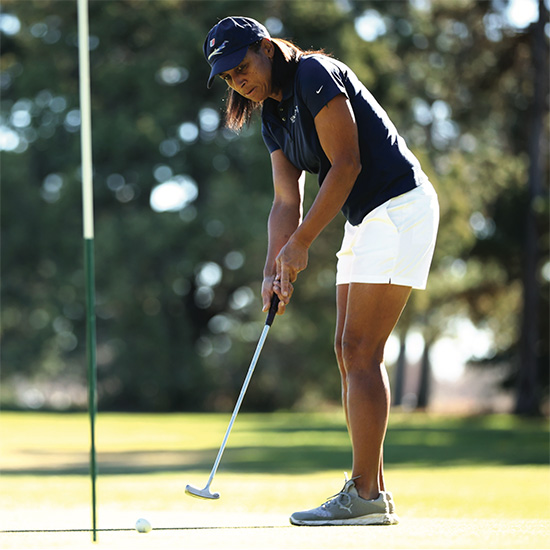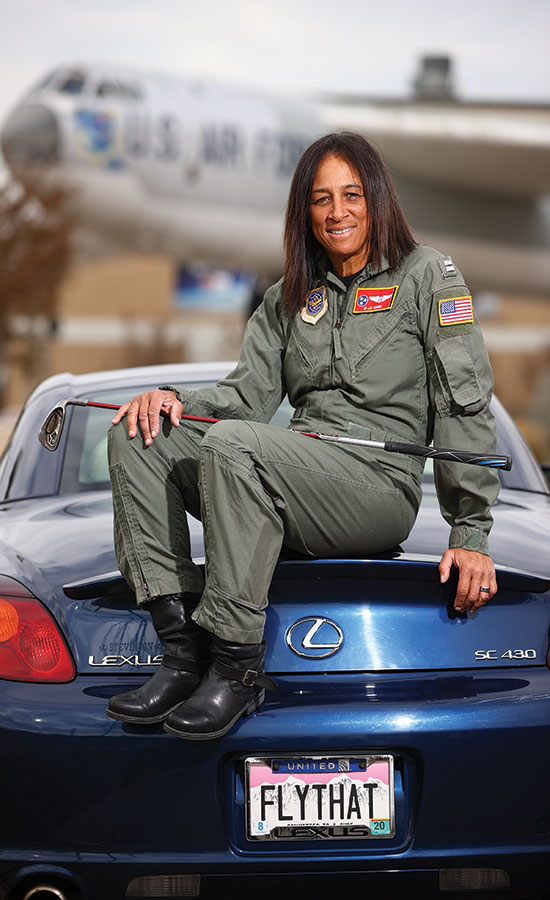SENIORS TAKE THE STAGE AT COLORADO SENIOR OPEN IN AUGUST
What to know about this year’s Colorado Senior Open

By Anthony Cotton | Photographs by Jamie Schwaberow / Clarkson Creative
FOR SOME PEOPLE, it takes a little bit of time to find their footing in life, deciding what path to follow. But sometimes, the universe makes it crystal clear what destiny has in store. For Anne Ward, one of the first inklings of where her youngest child Melissa was headed came pretty early on.
“I would have to get her off the top of the garage next door—she would climb up on the roof and jump off. The kids would come running in and say, ‘Mommy, Melissa’s on top of the garage again,’ and I’d run out and ask her to come down. She was just so fearless, even as a little baby. I had to be very, very careful with her because I really thought she might not live to be three—I thought, ‘Maybe if I can just get her to three, perhaps she would understand.’
“I told her one day about then, ‘Melissa, you can’t do these things because you could die.’ She just looked at me and I asked her if she understood what dying meant—that there would be no more Melissa, that we would have to give away all her things because she was never coming back.
“She said, ‘Mommy, that’s serious.’ I said, ‘That’s what I’ve been trying to tell you.’”
Understanding is one thing; letting that knowledge change who you are is something else. Which is why, many, many years after that Mother-Daughter chat, Ward, now known as M’lis, is still leaping off roofs. After college, she joined the Air Force, where she flew jets that reached speeds over 770 miles per hour, cracking the sound barrier—an experience that she describes today with a nonchalant, “kinda ho-hum.” When she left the military, she switched to a different kind of machinery, becoming a pilot for United Airlines, where she crashed through another wall—becoming the first Black female captain in commercial aviation.
Anne Ward tells another story of a young M’lis sitting in a car driving through suburban Chicago and noticing the traffic at a small airport.
“There were all these small planes; and she looks at them and she looked at me and she says, ‘Mommy look at all those cute little baby planes…you know, when I get big, I’m gonna fly a plane.’”
For her part, M’lis says she doesn’t remember the story, adding that Mom might be romanticizing her daughter’s relationship with flight.
“It wasn’t anything like, ‘My dad was a pilot, so I wanted to become a pilot,’ or I grew up watching planes land, and take off, out in the Podunk town where we lived and said that’s what I was going to be when I grew up,” she said. “That’s just not me; it just kind of fell into my lap and I said, ‘Sure, let’s try it.’”
That may not be totally accurate either. Ward admits to being an “overachiever,” a rather benign description that doesn’t go nearly far enough to describe her life’s journey. At a time when very few women were even given the opportunity to try and become a pilot in the Air Force, she says she caught a break in her burgeoning career when one of the officers in charge of her collegiate ROTC unit talked her up to one of the men in charge of handing out the precious slots in the branch’s flight training program.
At the time, the two were sitting in the stands at the University of Southern California, watching Ward as she played for the Women of Troy—as in the two-time national championship winning Trojan team led by Cheryl Miller, arguably the best women’s player of all time, and Cynthia Cooper, a four-time WNBA champion who, like Miller, is also a member of the Basketball Hall of Fame.
While Miller and Cooper entered USC with immediate credibility; Ward was a walk-on, battling to first earn a place on the roster and then for every minute of playing time she could get. Oftentimes that meant pushing the team’s stars in practice, because the harder they worked there, the better they would play in the games. That in turn meant more blowout victories—which meant more opportunities for Ward to get on the floor.
Of course, there were times when Ward pushed a little too hard in her role as scrappy underdog.
“We were at practice one day before a game against Long Beach State, a game that we really needed to win,” she said. “The starters were kind of slacking and the subs were really taking it to them—I must have scored four or five baskets in a row, and our coach stops the practice and says, ‘Who. Is. Guarding. Melissa?’
And I yell out, ‘Coach—Nobody! Nobody’s guarding Melissa because they can’t stop me!’
So play resumed, and from that point, I don’t think any of my shots got near the top of the key, let alone near the rim. My shots were being blocked out of the gym—players were knocking each other over trying to get to me. And I was like, ‘Good—it’s about time you showed up.’
“Being on that team was one of the most important things that happened in my life, because it taught me how to work hard; it taught me how to set goals, it taught me how to compete and want to win and never accept losing easily—it really set the tone for my entire life.”
Which is why it’s perhaps not surprising that many of the people who spend time with Ward ascribe to a similar bent. Her best friend, Tanya Poel, who also flies for United, is another graduate of the Air Force flight training program. For a time, Poel also dabbled in competitive sports, even reaching one of her goals in 2004—qualifying for the Olympic Trials in the marathon. Another close friend, Carla Stearns, was an All- American softball and volleyball player at the University of Northern Colorado and is a member of that school’s Hall of Fame.
“We’re just like, ‘Set a goal and go do it,’” Ward says. “We just feel like that’s how everyone should be; we’re ‘If you don’t work hard for it, you don’t deserve to have it’ kind of people.”
So what does the woman who loves to compete and never wants to accept losing easily do when she decides to set aside the Chuck Taylors? Besides an ongoing flirtation with coaching hoops (a former assistant at Dakota Ridge High School in Littleton, Ward still coaches club basketball in the summer), she falls absolutely head-over- heels in love with the one sport certain to crush the spirit of even the hardest working individuals, the pursuit that doesn’t care if your name is Tiger Woods—you can still make a 10 on a par-3 while defending your Masters’ championship—golf.
“It really is a love affair—a competitive one,” Ward said. “You know how for some people, golf is a leisurely game? That’s not me; golf has become the place where I can continue my basketball career…people say ‘No one cares what you shoot’—well I care! I don’t want to ever put anything higher than an 85 down on the scorecard.”

Of course, for Ward and her friends, amid the pandemic, playing golf was far more than “playing golf”—“When everyone was quarantined, it was our escape from the compound; we had freedom because of golf,” she said. “We needed to feel like the world wasn’t falling apart, and golf did that; it really kept us all together, mentally and physically.”
Over the course of the season, Ward says she posted about 90 scores; playing in leagues at Wellshire and Broken Tee golf courses, her handicap dipped as low as a 5.9 before settling at 8.4.
If you’re reading this magazine, chances are you, or someone close to you, is so passionate about the game that others might regard you as a golf nut; there are undoubtedly stories you could tell that would demonstrate the lengths you would go to for the game.
Ward probably has you beat.
Given her current status with United, Ward actually only has to fly a handful of times per month. More often than not, the dates she chooses coincide with the worst weather Colorado has to offer.
“On those days, I can take my plane up over the clouds and everything’s fine,” she said. “I’d rather do that than have to fly on a really nice day when I could be playing.”
She comes by her passion for the game honestly. According to Anne Ward, M’lis’ father Grant would leave the house in Chicago early on Saturday mornings and not return until at least 36 holes had been played. And while he was more than willing to have his daughter tag along, some of Dad’s contingencies made M’lis reluctant to go all-in on the game.
“I would go to the course with him when he practiced; but he refused to teach me the game because he said the cost of playing golf was so prohibitive that I would have to give up the other sports that I played,” she said. “I played basketball, volleyball, softball and soccer and I ran track and field—so that just wasn’t an option I was going to take. Later, I played some when I was in the Air Force, but golf in the Air Force is kind of joke; it’s really more of a drinking sport, but it’s something you have to do—a commanding officer says, ‘Hey, we’re all going out and playing golf,’ then you go play golf.”
It wasn’t until she moved to Colorado that Ward’s relationship with golf finally blossomed. Walking on one day at Overland Golf Course in Denver, Ward found herself paired with some members playing a match in the course’s women’s league.
“I don’t think the starter was supposed to do that, but that’s when I discovered there were these things called leagues where people played together regularly, so I started doing that and from there I caught the bug. Playing basketball has gotten tougher as I’ve gotten older because the game is much more physical than it used to be; so I’m really glad that I play golf because it’s something I can do for a long time and it’s led to developing this great group of friends—it’s fantastic.”
In addition to playing, Ward is on the board of directors for the Colorado Golf Association, serving on a committee that determines the ratings for courses in the state. The depth of knowledge and conviction she displays while talking about the process of establishing those guidelines at the recently redesigned City Park Golf Course in Denver is simultaneously educational and a little bit intimidating.
“I have had the good fortune of getting to know M’lis through our shared passion for the game,” said Ed Mate, the Executive Director and CEO of the CGA. “M’lis is a consistently strong advocate for women’s golf and particularly, public women’s golf. She is never afraid to speak her mind and stand up for her beliefs. Like all of our board, her love of the game is clear and infectious— in a good way!”
In September, one of Ward’s coworkers at United’s flight training center retired; almost immediately, she said, he started applying for another flying-related job.
“And that’s how most pilots are; they can’t imagine walking away from flying,” she said. “I’m like, ‘Dude, you’re 65—how ’bout playing some golf or going fishing, or maybe traveling? And he says, ‘I just love it too much.’ That’s not me; when I get to retirement age, the only flying you’ll see me doing is sitting in first class, drinking wine when I’m on my way to Europe.”
When that day comes, chances are Ward’s golf clubs will be in the cargo hold. Right now, they can usually be found in the trunk of her spiffy high-performance sports car, the one with the vanity plates that read “FLY THAT.” But while we’re in a confessional mood, the truth is that M’lis Ward, the bad-ass, sound-breaking, fearless highflier…doesn’t like to drive fast.
“I might go five miles over the speed limit—it drives people crazy,” she said. “But I’m not a typical pilot; when I’m not at work, I never wear a watch; everything related to an airline is about being on time—you have to get to the gate on time; you have to push off from the gate on time; you need to arrive at your destination on time; when you have a layover, you have to wake up on time to catch the van to go out to the airport.

“So, when I’m away from work, I don’t want to care about the time…besides, when you fly for a living, everything else is really slow, so why even try?” Of course, that leisurely attitude puts Ward in good stead on the golf course. And while she says one of the reasons she’s so willing to walk away from the cockpit is because she has so many other interests to attend to, it’s hard to imagine very many of them being conducted without a 7-iron in her hand. Already, plans are being made for a trip to Pebble Beach to celebrate a friend’s 60th birthday; a little further down the line, when more progress is made with the pandemic, Ward would love to tee it up in Ireland.
And at that point, perhaps the chronic overachiever will truly be ready to commit to slowing down.
“You know, a lot of the golf leagues I play in, a lot of the women in them are retired and that’s all they do,” Ward says. “They play, like five days a week, and they’re in their fantasy football leagues… I’m a huge baseball fan—I’ve got Rockies’ season tickets.
“So I’m thinking, I’ve got baseball from April to October, and I’ve got football from September to January, and I pretty much have golf year-round…I mean, to me, I can’t think of a more perfect life, you know?”
Anthony Cotton is the editor of Colorado AvidGolfer.
This article was also featured in the Winter issue of Colorado AvidGolfer.
Colorado AvidGolfer is the state’s leading resource for golf and the lifestyle that surrounds it, publishing eight issues annually and proudly delivering daily content via coloradoavidgolfer.com.
What to know about this year’s Colorado Senior Open
Help your game this summer at the Insiprato Colorado Open